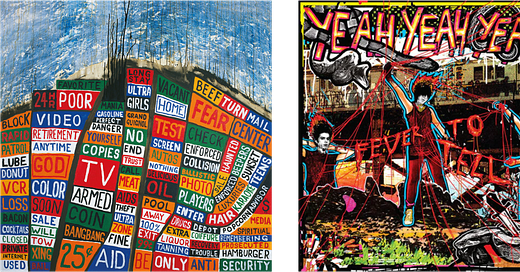Hamlet Hail to the Thief. Macbeth... Fever to Tell?
As the Radiohead/RSC mash-up opens, we ask the burning question: which other 2003 indie albums pair best with Shakespeare's tragedies?
By Andrzej Lukowski
I’m not ashamed to say that 2003 was a bloody good year for me, perhaps my peak as a human being. Okay, the bit where the West launched a ruinous invasion of Iraq on my twenty-second birthday wasn’t great. But as the End of History ended and the War on Terror hotted up, so too did the phenomenon that we geriatric millennials call ‘indie rock’. When I started university, indie nights were desolate and embarrassing. By 2003 the New Rock Revolution (ask your nan) was in full swing and normal people would go to them in large numbers in order to dance to records that were actually currently in the charts.
As the music editor of Leeds Student Newspaper I was in hog heaven: having recently discovered ‘travel expenses’ and ‘guestlists’, my life reached something of an apex when I blagged into Radiohead’s show at the Manchester Apollo on May 22.
I’m very old now: a husk of a man in a dying industry. I haven’t been to a gig this year. I haven’t been indie clubbing in a decade. Nonetheless, an ember of the old fire was rekindled when the RSC and Factory International announced they would be staging a production that combined my new life – moaning about Shakespeare plays – with my old one – enjoying the music of 2003. The show is Hamlet Hail to the Thief, which features a creative team headed up by Steven Hoggett and Thom Yorke himself, and opens at Aviva Studios in Manchester this week before heading to Stratford-upon-Avon in June.

Is it a marriage made in heaven? Well, not once have I ever listened to Hail to the Thief – released in June 2003 – and thought ‘ah, that’s just like Hamlet’. But Hamlet is a very long, very complicated play steeped in paranoia and existential dread and, well, that’s more or less how one might describe any Radiohead album.
But what other classic indie rock records from 2003 might pair thrillingly with Shakespeare’s other ten tragedies, I gabbled feverishly to Exeunt’s editor, who was still at school back then. I’ve thought longer than presumably any other human being has on the subject and here are my conclusions.
Titus Andronicus Permission to Land
The most preposterously OTT tragedy of the 1590s meets the most preposterously OTT faux soft metal album of the 2000s. You can’t do Titus without a pinch of salt these days, and The Darkness’s heroically absurd debut album is akin to a salt bazooka, with a big flaming mound of salt behind it, and everyone is eating pies made of salt. “Get your hands off my woman motherfucker!” Justin Hawkins might squeak as Lavinia is violently assaulted. “I believe in a thing called love!” he might trill – with some irony – as Tamora tucks into her ghastly dinner. What a thrill!
Romeo and Juliet You are Free
Screw bratty party girl takes on Shakespeare’s teen tragedy: Cat Power’s phenomenal 2003 opus You Are Free is a series of stylistically diverse meditations on the nature of freedom that frankly feels like it speaks considerably more obviously to the themes of Romeo and Juliet than Hail to the Thief does with Hamlet. In particular, its heartstopping homage to Kurt Cobain ‘I Don’t Blame You’ feels almost hauntingly appropriate for Shakeaspeare’s timeless tale of teen suicide.
Julius Caesar Room on Fire
Julius Caesar is a solidly entertaining play that even by the standards of this list isn’t especially tragic, certainly not in terms of Caesar himself (who is killed off early and deservingly). You know what else is solidly entertaining? Yeah that’s right baby – The Strokes’s second album Room On Fire. A record that’s simultaneously almost exactly as good as their landmark debut Is This It while considerably less remembered by history, I initially made this pairing quite arbitrarily – and because I quite like the idea of a chic new wave Caesar – but actually Julian Casablancas’s doomy urban mumblings are not without their resonance to the play: certainly ‘The End Has No End’ offers a cheeky little comment on Brutus and the gang’s doomed attempt to bring their beloved old Republic back.

Troilus and Cressida You Forgot It in People
The only time I actually saw Troilus and Cressida was in a conceptually batty Wooster Group vs RSC production that was good fun but did nothing to persuade me that Shakespeare’s eccentric ‘a chunk of the Trojan War, plus a random love story’ is a particularly serious play. Its rambling, all-over-the-shop quality would pair just peachily with Canadian collective Broken Social Scene’s magnificent second album You Forgot It In People, a bewildering and beguiling explosion of stonery noise, spindly electronics and actually-quite-devastating-if-you-listen-to-them lyrics of heartbreak and self-loathing performed by approximately one million different vocalists. The Emily Haines-sung ‘Anthems for a Seventeen Year-Old Girl’ is by far the most famous song and will do nicely for Troilus pining over Cressida.
Othello Kick Up the Fire and Let the Flames Break Loose
The internal debate I’ve had over whether to break free of the list’s designated parameters in order to select a non-indie rock album by a Black artist for Othello is, frankly, excruciatingly embarrassing. Jay-Z’s The Black Album certainly sprang to mind thematically, plus I can’t get the thought of how hypnotically inappropriate the chorus to ‘99 Problems’ would be. Nonetheless, rules are rules and white boy indie it is. I am perhaps the only person on this planet who remembers The Cooper Temple Clause, a bizarre hybrid of Oasis and Autechre who failed to make much of a dent on history but were pretty good. Anyway, they have absolutely nothing to say about race, but a lot to say about toxic masculinity and scorched earth jealousy – perhaps they’re more Iagos than Othellos, but that’s half the battle.
King Lear The Decline of British Sea Power
A band so British they would later have to take the word British out of their name because it was giving racists the wrong idea, Sea Power made an astonishing debut album that roars and wails with awe and sorrow for the natural world. Lear is very much a play about an English monarch dissolving under the elements and frankly it’s a sublime pairing, probably the best on the list if I do say so myself. As far as I know it’s the only album from 2003 with a song referencing the Trojan War, which is a bit of a bugger vis-a-vis Troilus and Cressida. But ‘A Wooden Horse’ isn’t actually particularly lyrically specific, and its achingly sad refrain “oh bring it in and let us see it” would surely gel beautifully with Lear bringing Cordelia’s body in.
Macbeth Fever to Tell
Probably my personal favourite album of 2003, Yeah Yeah Yeahs’ debut is best known these days for harbouring unexpected TikTok anthem ‘Maps’. And certainly that lovelorn gem can cover the limited but real romantic side of The Scottish Play. The rest of the record sounds like a trio of psychopaths gargling needles while trying to beat a man to death in a bin with a weirdly treated guitar and is, therefore, highly appropriate for Shakespeare’s gory, pacey, dark magic-filled thriller.
Timon of Athens Elephant
Pairing the most famous record on this list with a strong contender for the most obscure play may seem like a gesture of perversity. But frankly this narrative about a cranky misanthrope who renounces the modern world to go and live as a hermit fits just perfectly with Shakespeare’s Timon of Athens. A little indie rock humour for you there ladies and gentlemen! But clearly Jack White’s luddite grumpiness finds some fairly clear resonance in the play, plus Elephant is wall to wall bangers and frankly any production of Timon could do with that lift.
Antony and Cleopatra Echoes
An interesting (if you’re a nerd) thing about looking back at 2003 end-of-year best-of lists is how The Rapture’s Echoes tops most of them and has now largely been forgotten (replaced in the public consciousness by the more dad-friendly LCD Soundsystem, no doubt). And truth be told, the New York band’s icy, yelpy, strangulated funk punk is not an especially easy listen. Nonetheless, their awesome, cowbell-tastic anthem ‘House of Jealous Lovers’ endures and feels like it could basically be the theme song to a spiky enough revival of Antony and Cleo.
Cymbeline De-Loused in the Comatorium
I refuse to believe anybody has ever listened to any album and thought ‘wow, that’s so Cymbeline!’ The Globe staged a version a few years back renamed Imogen that was full of dubstep bangers and was probably about the closest I’ve seen to a musical makeover for a Shakespeare play prior to this, and even that foundered on how all over the shop Cymbeline is. Also, frankly, Shakespeare was having a laugh when he called it a tragedy: I’ve dutifully included it on this list but I want Shakespeare’s ghost to know I did so resentfully. Anyway, let’s go with post-hardcore prog outfit The Mars Volta’s seminal-ish debut De-Loused in the Comatorium. The record already has a nominal story to it – about a guy who falls into a coma after ingesting ray poison – but possibly its apocalyptic weirdness and general angsty volume will make Cymbeline feel tragic by hook or by crook.
Coriolanus Who Will Cut Our Hair When We’re Gone?
Frankly I could tell you that Montreal duo The Unicorns specialised in songs about politicking in pre-Imperial Rome and you’d probably just wearily nod it through at this stage (clever-slash-bored readers may well have deduced that another thing I did in 2003 was move to Canada, giving my knowledge of the year’s indie rock an even more obtuse spin). Anway, Who Will Cut Our Hair When We’re Gone? is a considerably jauntier record than Coriolanus is a play, but there’s something about the weird structure of Shakespeare’s Roman tragedy – it comes within spitting distance of being the original good-guy-teams-up-with-the-bad-guy drama but ultimately refuses to do it – that has always fascinated me, and is somewhat reflected in The Unicorns’ berserk approach to pop, wherein none of the catchy pop songs have choruses. Also they’re all about death, which helps.
Hamlet Hail to the Thief is at Aviva Studios, Manchester, to 18 May, and at the Royal Shakespeare Theatre, Stratford-upon-Avon, 4 to 22 June














A few years ago I read a proposal on the internet for "Much Ado! About Nothing", arguing that a) the play would be a perfect fit for a '00s Warped Tour setting b) America should start developing the habit of adapting Shakespeare this way as the UK does. Sadly I don't think anything more came of it, and it's now vanished from the Internet as far as I can see.